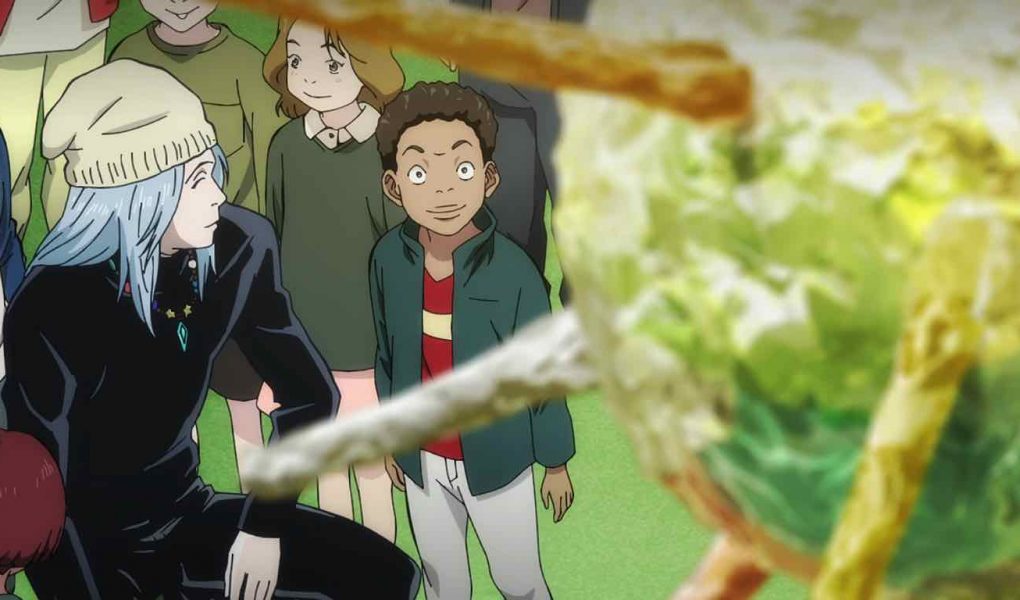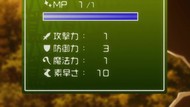Another week, another jaw-dropping episode of Pluto. Each one is a little masterpiece in its own right, and this one was no exception. I feel as if two things were made absolutely clear here. First, if there were any concerns that the narrative would be thrown off by the absence of Gesicht, they were summarily dismissed. And second, there can by no question of Abullah’s abject evil. For him to target Epsilon, knowing what he knows, shatters any illusion that he’s simply seeking justice. This is bloodlust, no more and no less.
While Epsilon is the spotlight character in this volume, in many ways it’s little Wassily (Miura Chiyuki) who drives the narrative (I’m uncertain why a boy with a Russian name was found in Persia, but never mind). “Bora” has been his only word since Epsilon found him in the rubble – rubble that he’d been ordered to vaporize along with the remains of all those robots the Bora Commission found in Persia. Wassily has seen more of the truth than anyone alive, possibly, even if he’s unable to communicate it.
I only just realized it, but there’s something just a bit childlike in all the great robots of Pluto as Urasawa writes them – even above and beyond Atom and Uran, I mean. It’s subtle enough to evade easy notice, but it’s there – an essential element of character that unites all of them. That’s no doubt a major reason why children seem to gravitate towards them – and vice-versa – as we’ve seen in multiple cases.
Epsilon is like all the great robots in this series, far nobler than the humans who exploited them. He’s not someone anybody outside the military industrial complex should have any problems with – he’s peaceful to a fault, he devotes his life to protecting war orphans, he extends his kindness to anyone whether they’re receptive or not. But that doesn’t stop him from being a target of Abullah, who seems bent simply on destroying anything even indirectly connected to his own suffering. Abullah’s crimes are terrible, but perhaps none worse than the atrocity he’s inflicting on Sahad.
Ultimately it was Epsilon’s commitment to pacifism that was his undoing. He, and he alone, bested Pluto in battle – in the skies above the safehouse where he’d been transported along with a bodyguard (Takaguchi Kousuke) who himself proves to be a man of supreme courage and nobility. Does that mean Epsilon was stronger than any of the robots who battled before him? Perhaps – though by this time it was clear that Pluto was desperate to free himself from Abullah’s control. But Epsilon didn’t finish his enemy off, because “I have no enemies” is his mantra and because he sensed the agony that Pluto was suffering.
While this was happening, Epsilon’s children were also being attacked at his home in Australia. And by something even more terrible than Pluto, it seems. There are certainly at least two forces working at Abullah’s disposal, it’s clear – and thanks to Wassily it’s also clear that this other force is Bora. We also know that Tenma was working with Abullah on the creation of the “ultimate AI”, and discussing the same method for waking it that he would ultimately use on Atom.
While Epsilon is testifying about his battle with Pluto (the committee are assholes but to be fair, they were absolutely right to be worried) Abullah sends an agent to Australia to, effectively, buy Wassily from the caretakers – knowing he would be bait that Epsilon would never refuse to take. Abullah is laboring under the impression that once Epsilon is dead, his main task will have been completed (though by appearances robots like Uran and Helena seem as advanced as the Seven). He doesn’t know, of course (not even Ochanomizu does), that Tenma is secretly working to bring Atom back – using the very method he applied to what seems mostly likely to have been the eventual Pluto (or Bora).
Back in Tokyo, Uran finally meets Tenma – at Tobio’s grave, fittingly. Tenma is suitably impressed, praising her as Ochanomizu’s masterpiece (one senses this is not a man given to praising others easily). But he seems strangely reluctant to acknowledge the obvious emotions that she and other AIs feel. Uran’s school principal – this is a clever Tetsuwan Atom cameo, as it’s Ban Shunsaku (Takagi Wataru – imagine getting a legend like that for such a small role, but when Maruyama asks…) – finds her reaching Pinocchio. It’s no mystery who she’s talking about when she says the one committing these acts is a puppet, like the wooden boy. But her comment that Geppetto is a puppet too is considerably more cryptic.
Epsilon’s death is another in the sad drumbeat of this story, a truly noble creature taken for no good reason. His end could hardly have been more true to himself, however – protecting his beloved Wassily and his bodyguard, and choosing to die himself rather than to become a killer. His seems to have passed the essence of himself on to Pluto somehow – that’s the Occam’s Razor explanation for Uran’s “poetic” description – and Tenma has obviously used Gesicht’s unstable emotions as the means to revive the astro boy.
And then there was one – though of course, Abullah doesn’t know that. Atom has been tasked with the crusade of those who perished, to stop Abullah’s madness. And perhaps a lot more, as Wassily’s unsettling song about Bora “eating the world” seems to be coming to pass. What is this new Atom going to be, however – when even Tenma fears that he could wake up as a “demon” (implying that’s what happened the first time)? Is the boy Tenma created noble enough and strong enough to remain himself when subjected to the existential assault being inflicted on his consciousness?
The post Pluto – 07 appeared first on Lost in Anime.




